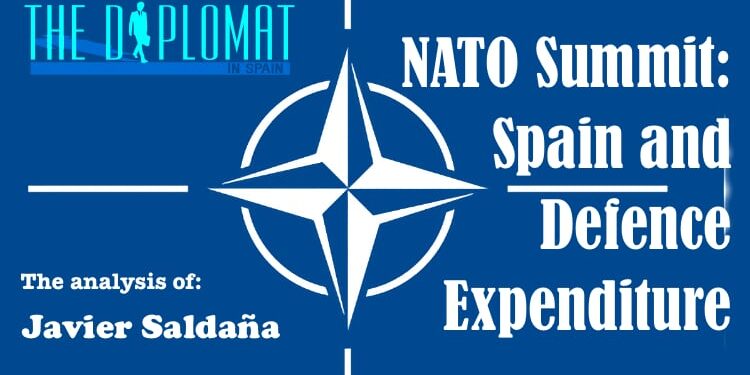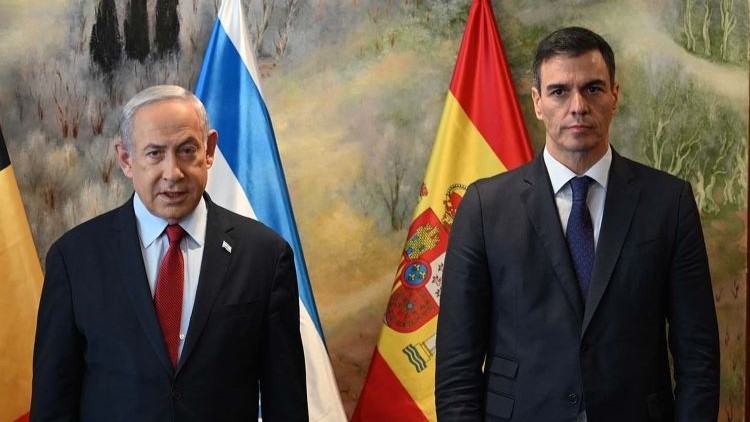SUMMARY
Spain arrives at this week’s NATO summit in Washington with an investment of 1.28 per cent of GDP in defence, one of the lowest among the 31 countries that make up the Alliance, a percentage far behind the twenty or so NATO members that already exceed the 2 per cent threshold. North Atlantic militancy today implies more than just commitments on paper and above all a firm intention to increase military spending.
Javier Saldaña Sagredo/ Escudo Digital
Spain arrives at the NATO summit being held in Washington from 9 to 11 July as the NATO country that will spend the least on defence in percentage terms in 2024. According to a report that the Alliance itself has published on its official website, Spain will have a defence budget of 19,723 million euros, or 1.28% of GDP.
Within the Organisation, the top positions are occupied by Poland (4.12%), Estonia (3.43%) and the US (3.38%), which together with 20 other members already exceed the 2% threshold established at the Wales Summit (2014). At that time, only the US, the UK and Greece exceeded this threshold, which was established as a minimum investment floor to be reached in the following ten years. Now that this theoretical deadline has been met, only eight countries have yet to surpass it: Croatia, Portugal, Italy, Canada, Belgium, Luxembourg, Slovenia and Spain, which is at the bottom of the 31 countries that make up the Alliance.
It seems as if Spain has not yet recovered from the devastating period in terms of defence investment that devastated NATO itself in the wake of the “pacifist” wave that followed the fall of the Berlin Wall. Shortly afterwards, on 14 November 1996, the Spanish Parliament decided, by 293 votes to 27 with four abstentions, to authorise the government to negotiate Spain’s full integration into the military structure of the Atlantic Alliance, which already had a Spaniard as Secretary General. At that time, the Organisation declared that it had no enemies and its satisfied leaders met at the 1997 summit in Madrid ready to celebrate the 50th anniversary of the Organisation two years later in Washington. In the federal capital, a new Strategic Concept was approved that no longer regarded the former USSR and its Warsaw Pact as the conventional enemy studied in military academies, declaring the “birth of NATO in the 21st century” and setting out an action plan for the accession of new members from the Eastern bloc, which was quickly joined by the Czech Republic, Hungary and Poland. The “Cold War” was over.
Lack of funding
With NATO’s popularity at an all-time high, the Alliance was “dying of success”, resolving the Balkan conflict by force, albeit under the auspices of the UN, without Boris Yeltsin’s weakened Russia being able to do much to preserve its former pan-Slavic sphere of influence. Our country, a new and enthusiastic participant in peace operations at the time, became actively involved in the area in 1992, in a mission that under the various UN/NATO/EU “umbrellas” involved some 50,000 Spanish Armed Forces troops for almost twenty years.
Paradoxically, however, in those years the incipient investment in defence that the first governments of the transition in our country had begun with acquisition programmes such as the Future Combat and Attack Aircraft (FACA), Eurofighter, Leopard and the F100 frigates did not continue, and not even the exponential increase in peace operations could stop the lack of defence funding that was becoming endemic in relation to other neighbouring countries.
Our defence budget was already at the tail end of the Organisation in terms of percentage of GDP, continuing its free fall since 1984, when it had reached an all-time high of 3 per cent. Socially and politically, Spanish society was distanced from defence issues in the belief that “full” NATO membership would solve the security problem. The false sense of peace and security brought about by the disappearance of a declared enemy and the euphoria of the Alliance’s new protective umbrella caused National Defence Directive 1/2000 to urge the Ministry of Defence to “seek greater political, social and institutional consensus” on defence matters through a Strategic Defence Review (RED) that came out in early 2003. In this way, the deterioration of Defence awareness in Spanish society became a matter of debate in the forums where National Defence was analysed.
Impact of the 2008 crisis
But investment still did not come in adequate amounts for the army and navy. The economic crisis of 2008 aggravated the situation and led Spain to hit the bottom of the defence budget in 2016 (1.1 %). Without our entry into NATO, prioritising defence based only on external actions to promote peace, as holistically occurred at the end of the last century and the beginning of this one, could have placed us in a situation similar to that of Finland and Sweden, which were determined to join NATO as soon as the Russian invasion of Ukraine took place. Now the situation is different. It is about more than peace operations, cooperative security, training missions and advice to third countries; it is about preventing the war from spreading uncontrollably. After diplomacy, NATO’s deterrence measures are now more crucial than ever in the international context.
Fortunately, therefore, since the Wales Summit, our country has been aware of the responsibility of membership in NATO, a select club that requires high democratic and social standards, a privilege that few countries in the world can boast. These standards surely include a number of fundamental values intrinsic to Western societies that are part of the Organisation. In order to preserve them, it is undoubtedly necessary to invest in defence in accordance with the real possibilities of each Member State and for our country, although the defence budget has been slowly rising to 1.28% of GDP this year, the percentage seems insufficient in relation to the place Spain should occupy in the world. Taking a position in favour of Spain’s membership of NATO today is not as simple as it was in 1996. North Atlantic militancy today implies more than just commitments on paper and above all a firm intention to increase military spending.

Javier Saldaña Sagredo. Colonel in the Army Reserve.
He has held posts at Eurocorps Headquarters, at the Spanish Embassy in Jakarta (Indonesia) as Military and Defence Attaché and at the Centro Superior de Estudios de la Defensa Nacional (CESEDEN) as Professor of Diplomacy and Defence Culture. He holds a diploma in General Staff and in Advanced Military Studies and Defence Policy from the French Republic. He has participated in NATO and EU international missions in the former Yugoslavia and Libya.







